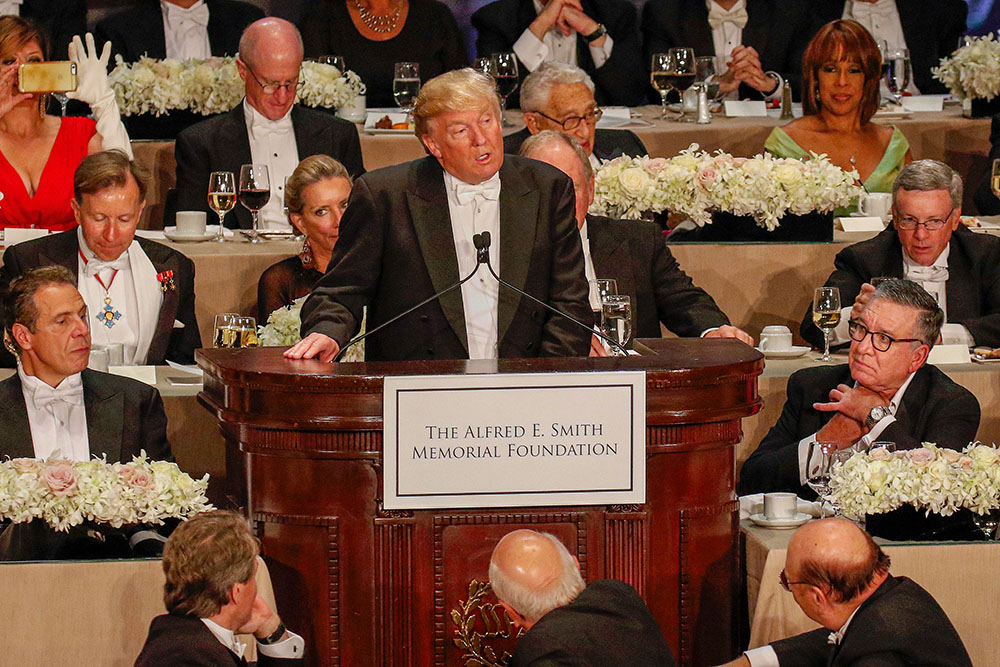Why it is smart for Kamala Harris to skip the Al Smith dinner
“Never wrestle with a pig. You both get dirty and the pig likes it.” We don’t know if that adage was the precise thing Vice President Kamala Harris had in mind when she opted not to attend the Al Smith dinner. Looking back at Donald Trump’s boorish appearance at the 2016 Al Smith dinner, it is hard […]



“Never wrestle with a pig. You both get dirty and the pig likes it.”
We don’t know if that adage was the precise thing Vice President Kamala Harris had in mind when she opted not to attend the Al Smith dinner. Looking back at Donald Trump’s boorish appearance at the 2016 Al Smith dinner, it is hard to second-guess her decision.
The Alfred E. Smith Memorial Foundation Dinner is an annual event, the purpose of which is twofold. The principal reason is to raise money for Catholic Charities. The second purpose is to permit the two presidential candidates a forum for good-natured banter, gentle jabs.
In 2016, Trump ignored both purposes. His nasty attacks on his opponent, Hillary Clinton, drew boos from the audience — a first — and distracted coverage of the event away from the good works of Catholic Charities. And there was nothing she could do or say. It was unprecedented and it was ugly.
Unsurprisingly, Trump responded to Harris’ decision to not attend the dinner with a social media post that stated, “It’s sad, but not surprising, that Kamala has decided not to attend. I don’t know what she has against our Catholic friends, but it must be a lot, because she certainly hasn’t been very nice to them, in fact, Catholics are literally being persecuted by this Administration. Any Catholic that votes for Comrade Kamala Harris should have their head examined …”
Alas, Trump fails to realize we Catholics believe in examining our heads regularly. We call it an examination of conscience.
Clinton, President Joe Biden and Harris have all faced the same problem: How do you respect the bounds of normalcy and decency when your opponent not only fails to recognize such boundaries, but has actually made his ability to blow through such boundaries part of his essential schtick?
This problem manifested itself in the days after the second assassination attempt on Trump when he and his running mate, Sen. JD Vance, blamed the Democrats’ rhetoric for inspiring the attempt, and called for everyone to “lower the temperature.” This is rich coming from those two.
Our political rhetoric is hot, to be sure. But surely truth is as important as temperature. Here is the conundrum: How do you point out that your opponent has fascistic tendencies without raising the temperature? Is there a noninflammatory way to make that case that Trump really is a threat to democracy?
Trump is a master at igniting what historian Robert Paxton has called “mobilizing passions.” Paxton wrote that those passions are the “emotional lava” of a political movement.
Among other such passions, he noted “the superiority of the leader’s instincts over abstract and universal reason,” “a sense of overwhelming crisis beyond the reach of any traditional solutions” and “the need for authority by natural leaders (always male), culminating in a national chief who alone is capable of incarnating the group’s destiny.”
Paxton is a historian of fascism.
For all of my disagreements with and concerns regarding the contemporary Democratic Party and Harris’ candidacy, nothing she has done evidences such fascistic mobilizing passions.
As is the case with Trump’s and Vance’s false attacks on Haitian migrants, Trump’s and Vance’s accusing Democrats of inflammatory rhetoric is intended to muddy the waters. The same holds true for Republican complaints that his many indictments are unprecedented. It is true. They are unprecedented because we have not had a president who was so willing to break the law.
Low-information voters will have a harder time sorting out who is inflammatory and who is a threat to democracy if the waters are muddy, and the GOP knows that. The only way to try and unmuddy the waters, and avoid the charge of being inflammatory, is to make an argument, each and every time.
Demagogues live on slogans. Democracies thrive on arguments. Don’t call Trump a fascist. Explain why his own words indict him of harboring fascistic ideas. Harris is a prosecutor. She knows how to do this.
The other thing Democrats should do in the remaining weeks of the campaign is acknowledge why many voters are suspicious of typical politics and elite opinion. It would help Harris enormously if she gave a speech acknowledging that NAFTA was a mistake, and detail a more thorough repudiation of neoliberal economics. It would help if she gave a speech in which she abandoned not one iota of her commitment to abortion rights, but promised not to force Catholic and other religious organizations to pay for abortion coverage in their insurance plans.
In her Aug. 29 interview with Dana Bash, when asked about her changed position on fracking, Harris explained herself perfectly. She articulated her values, spoke about what the Biden-Harris administration had done to confront climate change, and then added, “What I have seen is that we can grow and we can increase a thriving clean energy economy without banning fracking.”
Saying something like “we can guarantee a woman’s reproductive rights without forcing Catholic organizations to pay for it” would go a long way to deflating the GOP’s charges that it is the Democrats who are extremists on the issue.
This election is still shockingly close according to all the polls. As many as 18% of voters have not definitely made up their minds. It is hard to know what will move them one way or the other, but Harris can surely help her chances by explaining, methodically, why Trump really is a threat to democracy and she isn’t.














